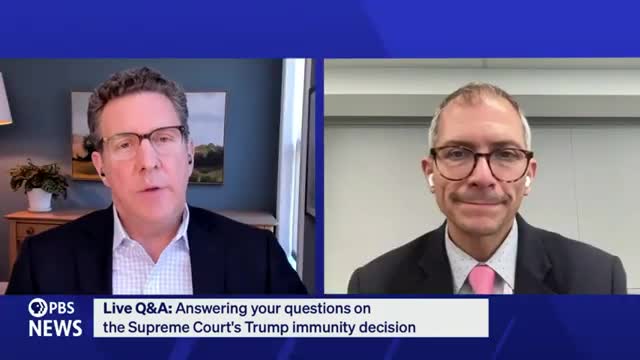Supreme Court ruling reshapes presidential accountability landscape

This article was created by AI summarizing key points discussed. AI makes mistakes, so for full details and context, please refer to the video of the full meeting. Please report any errors so we can fix them. Report an error »

In a recent government meeting, discussions centered around the implications of a court ruling regarding the prosecution of former President Donald Trump in connection with the January 6th insurrection and allegations of election subversion. The ruling has introduced significant ambiguity regarding which actions may still be prosecutable by Special Counsel Jack Smith, necessitating evidentiary hearings led by Judge Tanya Chutkin, who is overseeing the case.
As the meeting highlighted, the timeline for a potential trial is becoming increasingly constrained, with the upcoming November election looming. Experts expressed skepticism about the feasibility of bringing the case to trial before the election, despite acknowledging Jack Smith's prosecutorial skills and Judge Chutkin's commitment to expediting the process. The discussions suggested that unless Smith streamlines the charges—potentially by discarding certain elements of the original indictment—there may not be sufficient time to resolve the case before voters head to the polls.
The meeting also touched on the broader implications of the court's ruling, particularly regarding presidential immunity. It was noted that the decision primarily pertains to the president and does not extend to other government officials, such as governors or senators. The ruling establishes a presumption against prosecuting presidents for actions taken within the scope of their official duties, which could fundamentally alter the landscape of presidential accountability.
Participants in the meeting reflected on the historical context of the ruling, suggesting that the Senate's failure to convict Trump during his impeachment in January 2021 may have contributed to the current legal challenges. This perspective raises questions about the effectiveness of political accountability measures and the role of Congress in addressing potential abuses of power by the presidency.
As the legal proceedings unfold, the implications of this ruling will likely resonate beyond the courtroom, influencing public discourse on accountability and the limits of presidential power in the United States.
As the meeting highlighted, the timeline for a potential trial is becoming increasingly constrained, with the upcoming November election looming. Experts expressed skepticism about the feasibility of bringing the case to trial before the election, despite acknowledging Jack Smith's prosecutorial skills and Judge Chutkin's commitment to expediting the process. The discussions suggested that unless Smith streamlines the charges—potentially by discarding certain elements of the original indictment—there may not be sufficient time to resolve the case before voters head to the polls.
The meeting also touched on the broader implications of the court's ruling, particularly regarding presidential immunity. It was noted that the decision primarily pertains to the president and does not extend to other government officials, such as governors or senators. The ruling establishes a presumption against prosecuting presidents for actions taken within the scope of their official duties, which could fundamentally alter the landscape of presidential accountability.
Participants in the meeting reflected on the historical context of the ruling, suggesting that the Senate's failure to convict Trump during his impeachment in January 2021 may have contributed to the current legal challenges. This perspective raises questions about the effectiveness of political accountability measures and the role of Congress in addressing potential abuses of power by the presidency.
As the legal proceedings unfold, the implications of this ruling will likely resonate beyond the courtroom, influencing public discourse on accountability and the limits of presidential power in the United States.
View full meeting
This article is based on a recent meeting—watch the full video and explore the complete transcript for deeper insights into the discussion.
View full meeting